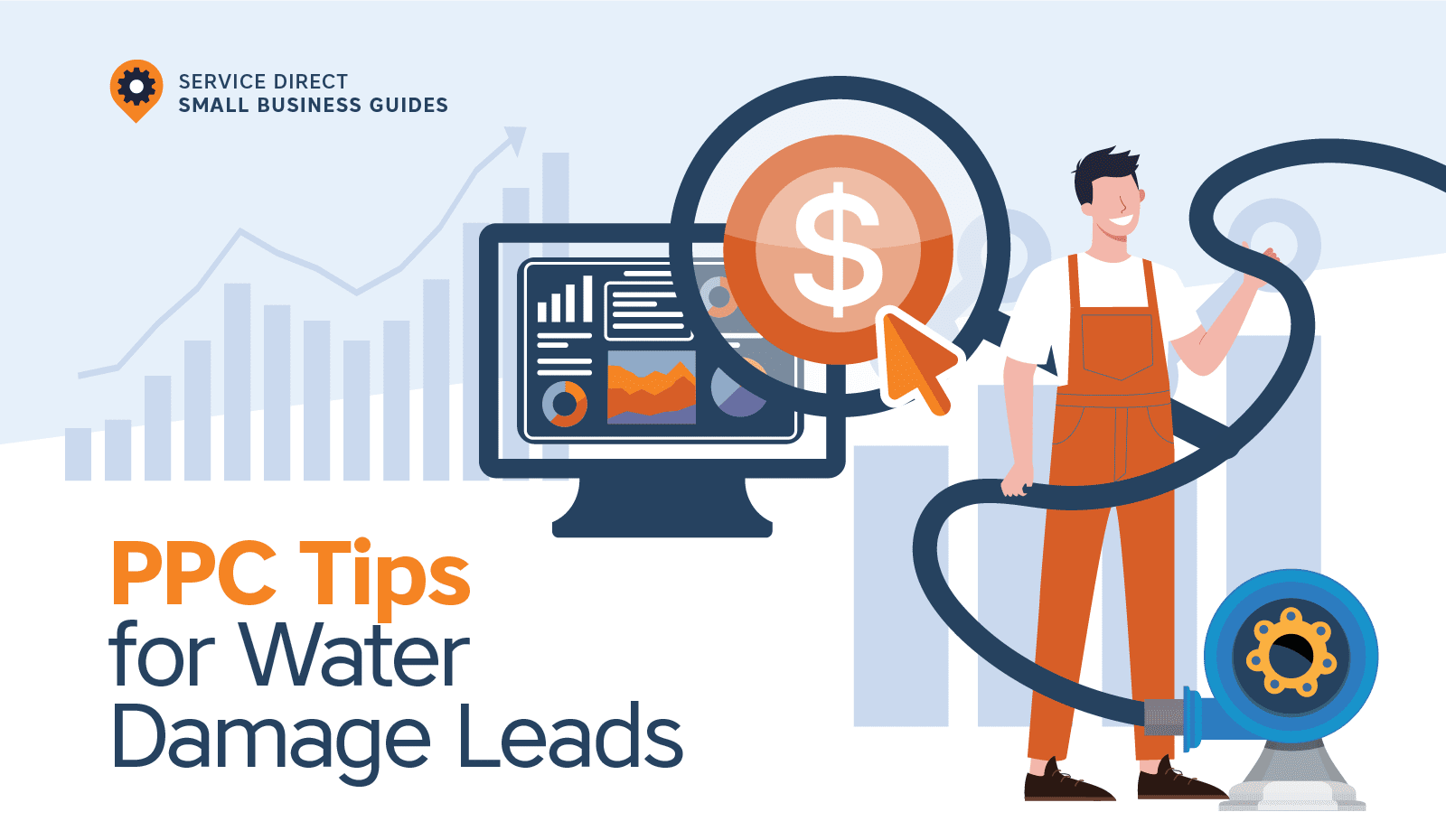Bring in More Water Damage Leads With These PPC Tips
For many home service companies, including water damage businesses, generating leads is one of the most important parts of your business. It's what allows you to continue providing high-quality services to your existing customers and it's how you grow as a trusted local company.
However, it's common for these companies to feel stuck on how to bring those leads in effectively without blasting through a small budget. But, with 87% of small business marketers listing PPC as an effective part of their overall marketing efforts, it’s worth investing in.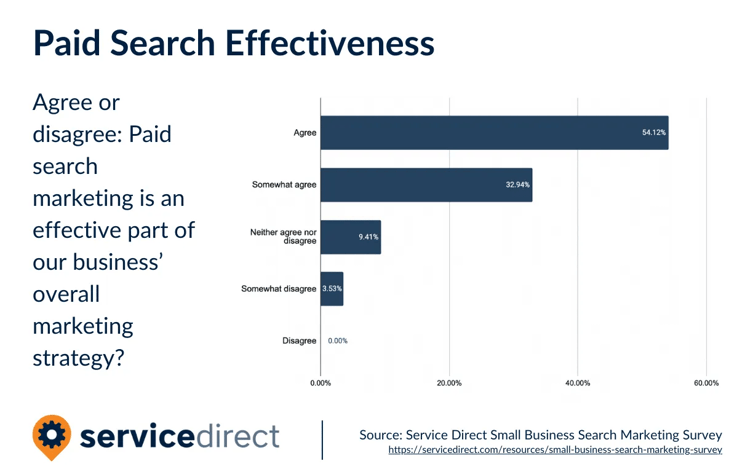
In other words, Pay per click lead generation is an affordable way to drive high-quality leads to water damage companies in the digital age, which makes it the perfect solution for companies like yours.
In this blog, we'll discuss how you can use keywords, website optimization, and tracking tools to develop and maintain a PPC strategy that drives the volume of leads to your water damage company you have been looking for.
PPC is Intimidating—But it Doesn't Have to Be
If at this point you're already feeling intimidated by PPC advertising, we want you to know that you're not alone.
In fact, 32% of companies said the biggest challenge for their paid search marketing efforts is planning and strategy. We've found that this is largely because small businesses feel intimidated by the work that goes into understanding PPC and learning how to implement an effective strategy.
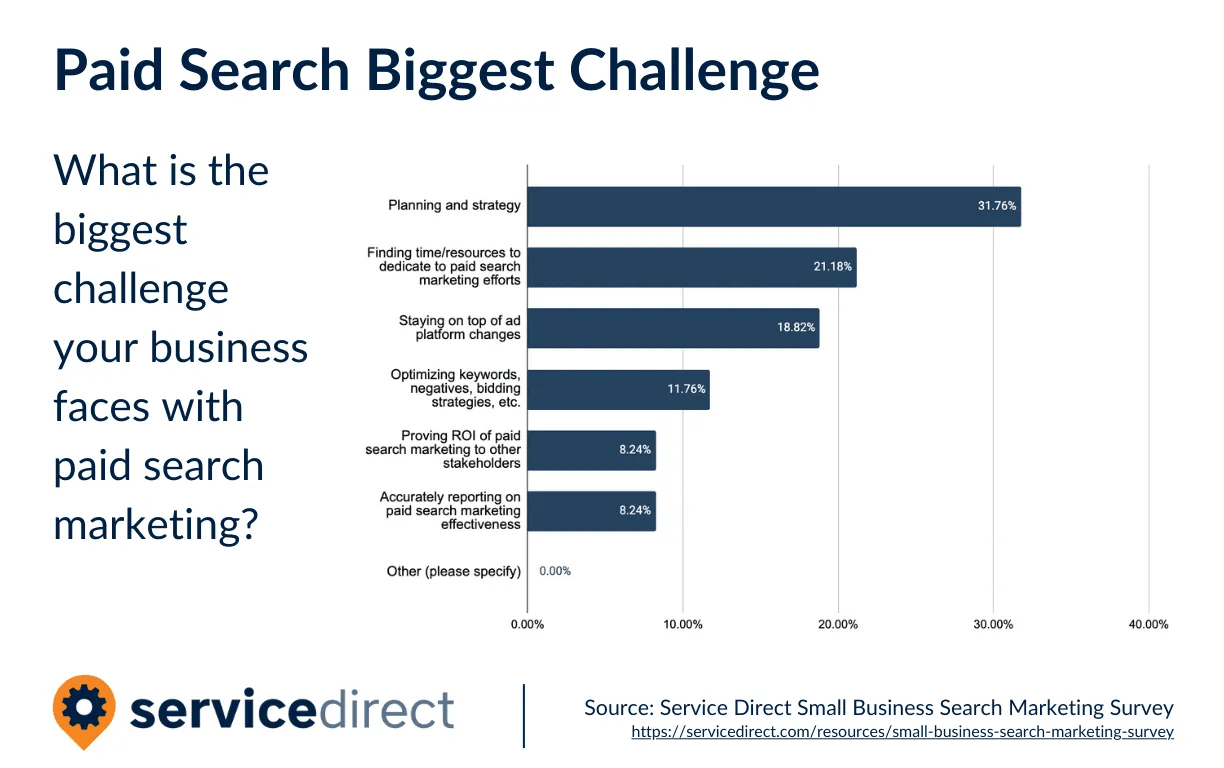
With these tips, you'll feel more comfortable diving into this corner of lead generation. And guess what? This means that you'll have an advantage over a number of your competitors who probably don't use PPC in their day-to-day advertising techniques.
Step 1: PPC Keywords for Water Damage Companies
The first thing we'll cover about PPC is keywords. Keywords are essentially the building blocks of your water damage PPC strategy, and they determine which ads get shown to which potential customers.
But what makes a good keyword? And how do you go about choosing the right ones for your business?
These are the important questions that many companies need to understand to see success with PPC from the beginning, and we're here to give you those answers.
Choosing the Right Keywords
If you're running water damage PPC campaigns, you'll want to make sure you're targeting the right keywords. After all, there's no point in paying for ads that no one is going to see. So how do you choose the right keywords?
There are a few things to keep in mind:
- Think about what terms people are likely to use when they're searching for a water damage company. That might include phrases like "water damage restoration" or "flood damage repair."
- Consider what kind of searches are most likely to result in a conversion—that is, someone actually contacting your company. That might mean targeting more specific phrases like "24-hour water damage repair" or "leak detection and repair."
- Don't forget to consider negative keywords—that is, terms that you don't want your ad to show up for. For example, if you only service residential customers, you might want to add "commercial" as a negative keyword.
By keeping these things in mind, you can ensure that your PPC campaigns are targeting the right keywords—and getting the best results for your water damage company.
Get Keyword Ideas with Google Keyword Planner
If you're running a PPC campaign for water damage, Google Keyword Planner is a great tool to help you come up with the right keywords. It's important to choose keywords that are relevant to your business and that have a high enough search volume to be worth targeting.
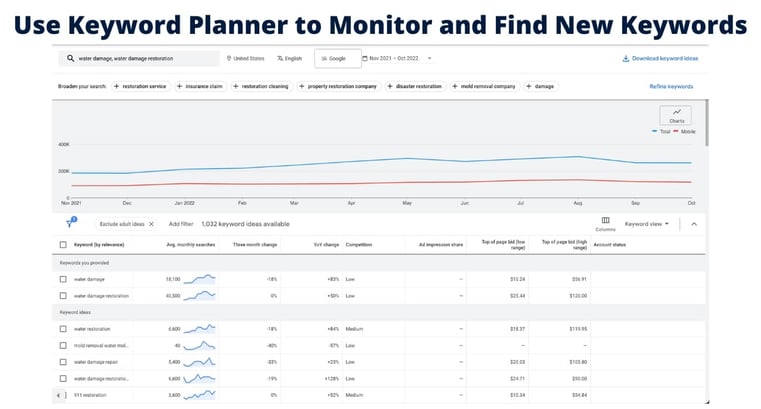
However, you also don't want to choose keywords that are too competitive, or you'll end up spending a lot of money on clicks without getting any results. Keyword Planner can help you find the right balance by showing you estimated traffic levels for different keywords. You can also use it to get ideas for new keywords to target. So if you're not sure where to start, Google Keyword Planner is a great resource.
Don't Forget About Setting a Keyword Budget
Before you dive too deep into starting PPC for your water damage company, you need to set a keyword budget. This will help ensure that you don't overspend at the outset of your strategy.
There are a few different ways to approach setting a keyword budget:
- Set a fixed budget for each keyword. This means that you will only bid on keywords that are within your budget.
- Set a daily budget for your entire campaign. This will allow you to bid on more keywords, but you will need to carefully monitor your spending to make sure that you don't exceed your budget.
- Set weekly or monthly averages that you want to hit for your campaigns. This will allow you to be more flexible with budgeting and keyword bidding without totally blowing your budget away.
Whichever approach you choose, setting a keyword budget is crucial to ensuring that your PPC campaign is successful.
Use Smart Bidding to Help With Keyword Budgets
PPC budgets can be a tricky thing to manage. You want to make sure you're getting the most bang for your buck, but at the same time, you don't want to overspend. Google Smart Bidding can help you strike the perfect balance.
With Smart Bidding, Google will use its AI to automatically adjust your bids based on a variety of factors, including search keywords, time of day, and user demographics. This ensures that your ads are being shown to the people who are most likely to convert, and as a result, you'll get more clicks for your money.
So if you're looking to get the most out of your PPC budget, Google Smart Bidding is definitely worth considering.
Let's Discuss Keyword Negatives
We've mentioned negative keywords in this blog a few times already. These keywords are words or phrases that you add to your campaigns that tell Google not to show your ad for certain searches.
For example, as a water damage company, you might want to add the keyword "careers" as a negative keyword so that your ad doesn't show up when someone searches for "water damage careers." Using negative keywords can help you to avoid wasting money on clicks from people who are not interested in buying what you're selling.
It can also help you to improve your click-through rate and quality score, which can lead to lower costs per click.
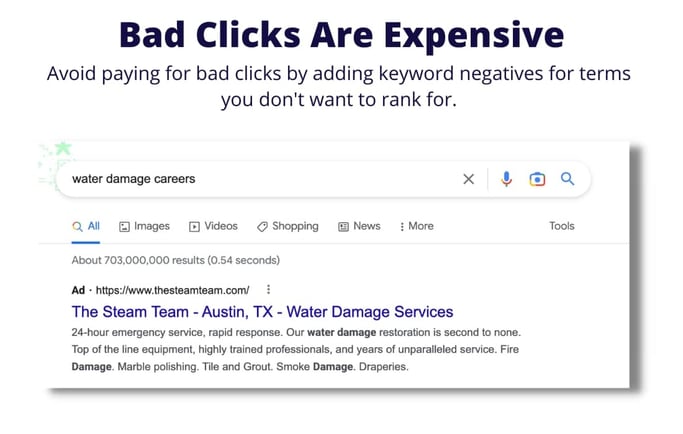
So why are negative keywords often put on the back burner? One reason is that they can be time-consuming to research and add to your campaigns.
However, the effort is worth it if it means that you'll be able to improve your PPC results. Another reason is that some marketers believe that they don't need to use negative keywords because their ads are already well-targeted. However, this isn't always the case.
Even the most relevant ad can be shown to people who are not interested in what you're selling. So don't neglect negative keywords—they could be just what you need to take your water damage PPC campaigns to the next level.
PPC Reporting and Tracking for Water Damage
Any successful digital marketing campaign relies on knowing which tactics are working and which aren't. That's where reporting and tracking come in.
With PPC, reporting and tracking revolves around understanding your metrics. Metrics are the numerical values that tell you how your campaign is performing.
There are a lot of different metrics to pay attention to, but some of the most important ones are click-through rate, cost per click, and conversion rate.
By understanding these metrics and more, you can make informed decisions about your campaign that will boost your results. Furthermore, tracking your metrics over time will help you to identify trends and optimize your campaign accordingly.
Conversion Tracking for PPC Campaigns
One of the most important tracking tools available to your water damage company is PPC conversion tracking. Conversion tracking allows you to see how many people who click on your PPC ad eventually take the desired action, such as calling your company or filling out a form.
Without conversion tracking, it would be very difficult to tell if your PPC campaign is actually working. Fortunately, Google makes it very easy for businesses to implement this tactic in their PPC strategy.
There are a few different ways to set up conversion tracking, but the most common method is to add a piece of code to your website. This code will then track conversions and provide data that you can use to assess the effectiveness of your PPC campaign.
Ultimately, you will take this information to make any changes you deem necessary to see the level of success you desire with water damage PPC.
What About Quality Score?
Quality score is a metric used by Google to measure the quality and relevance of your ads, keywords, and landing pages. A high quality score means that your ad is relevant and useful to users, which often leads to a lower cost-per-click and a higher ad rank in the search results.
In other words, quality score is important because it directly affects both your costs and your visibility. Improving your quality score should be a key goal if you want to run a successful PPC campaign.
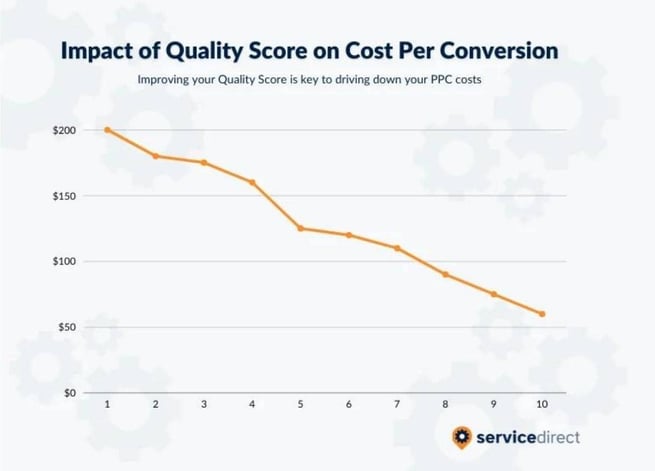 Service Direct results based on PPC campaigns we run for our in-house water damage traffic
Service Direct results based on PPC campaigns we run for our in-house water damage traffic
There are a few key things you can do to improve your quality score: use relevant keywords, create relevant ads, and optimize your landing pages. By focusing on these three areas, you should be able to improve your quality score and make your PPC campaign more effective.
However, it's important to note that quality score is not an effective tool to solely gauge your PPC campaign's success. It can be deceiving when looked at from a singular lens, which is why we recommend using it in conjunction with conversion tracking.
Create a Website Designed to Convert
The last step to creating the best water damage PPC campaigns possible is ensuring that your website encourages conversion. This is because you pay for clicks to your site, but you don't make any of that money back unless the potential customer is encouraged to purchase your services. That's what your website is for.
Write Engaging Content and Actionable CTAs
Your water damage website needs two things to be successful with PPC: engaging content and actionable calls to action (CTAs). Without both of these elements, your website is likely to underperform, no matter how well you optimize your PPC campaigns.
Engaging content is key to keeping visitors on your site and reducing your bounce rate. That means writing copy that is interesting and relevant to your target audience. It should be easy to read and understand, without being too heavy on jargon. And most importantly, it should compel visitors to take some kind of action, whether that's calling your business, filling out a contact form, or signing up for your newsletter.
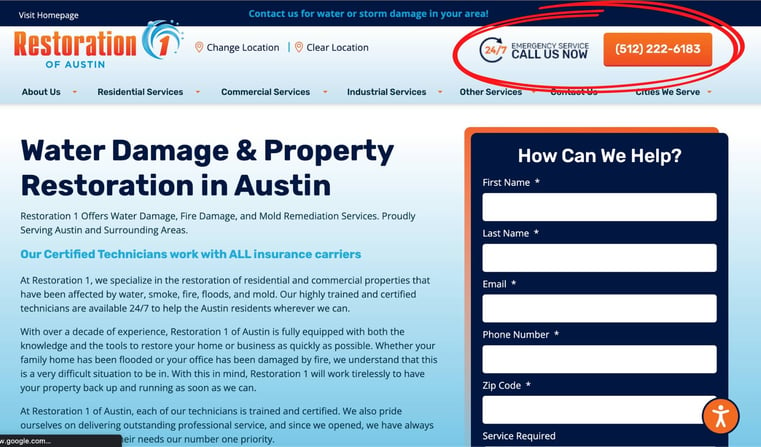
Source: restoration1.com/austin
Your CTAs should be just as compelling as your content. They should be clear and concise, with a strong sense of urgency, and they should be placed prominently on your page so that visitors can't miss them. Remember, the goal of your CTAs is to get visitors to act, so make sure they are actionable and relevant to the rest of your website.
By optimizing both your website content and your CTAs, you can improve the performance of your PPC campaigns and generate better results for your business.
Site Pages Can Help Boost Conversion
A lot of water damage businesses focus on driving traffic to their website through PPC ads, but what happens once those visitors land on your site? If you don't have well-optimized pages, you're likely losing a lot of potential customers. That's where site pages come in.
86% of small businesses deploy dedicated landing pages exclusively for their paid search traffic, and you should too.
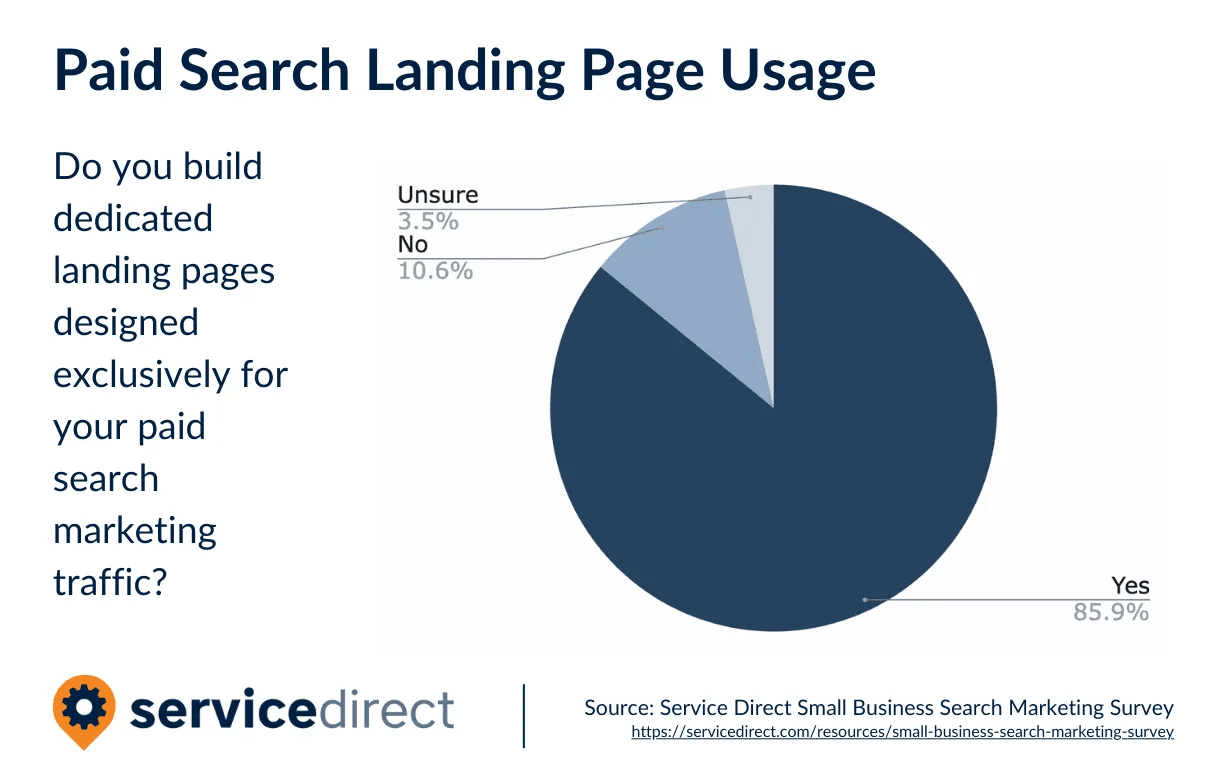
By crafting targeted and helpful site pages, you can guide visitors toward taking the desired action by establishing your expertise in the area they were searching for.
Some site pages to consider adding to your water damage website:
- Emergency Water Damage Restoration
- Mold Removal
- Commercial Water Damage Removal
- Sewage Cleanup
- Residential Drying and Water Removal
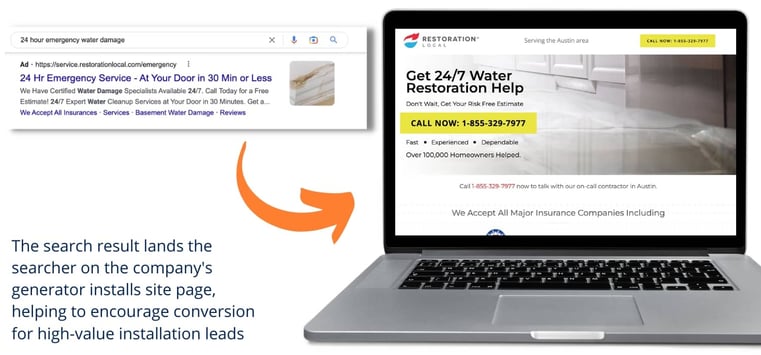 Source: service.restorationlocal.com
Source: service.restorationlocal.com
In addition, site pages can help to improve your quality score, which is a key factor in determining how much you pay for PPC ads. As a result, investing in site pages can be a valuable way to boost your conversion rate and save money on PPC advertising.
Solidify Your PPC Strategy With Site Performance
With 53% of users leaving a site that takes longer than 3 seconds to load, it's clear why your website's performance has a direct impact on your PPC campaigns.
If your website is slow, unreliable, or not optimized for mobile, potential customers are going to leave before they even have a chance to see what you have to offer. And if they do manage to stick around, they're not going to be very happy.
That's why it's so important to make sure your website is high-performing before you start running PPC ads.
There are a few key things you need to look at, such as your website's load time and its overall stability. If your website isn't up to par, your water damage company isn't even going to be in the running for customers' business, despite how great your PPC campaigns are.
So take the time to make sure your website is high-performing and mobile optimized, and you'll be able to run successful PPC campaigns that bring in new business.
Conclusion
Pay per click advertising is one of the most effective, yet underused, digital marketing strategies for water damage companies.
By following the tips in these blog posts, you should be well on your way to creating ads that are high performing and encourage click-throughs, as well as landing pages and CTAs that lead to conversions.
If you want more help with developing a digital marketing strategy specifically for your water damage company, download our guide. It contains even more information about how to create an effective online presence and drive leads through digital marketing channels.
Related Content
- How to Boost SEO for Water Damage Companies
- How To Make Your Water Damage Website Turn Visitors into Customers
- How to Use Email Marketing to Gain High-Quality Water Damage Leads

